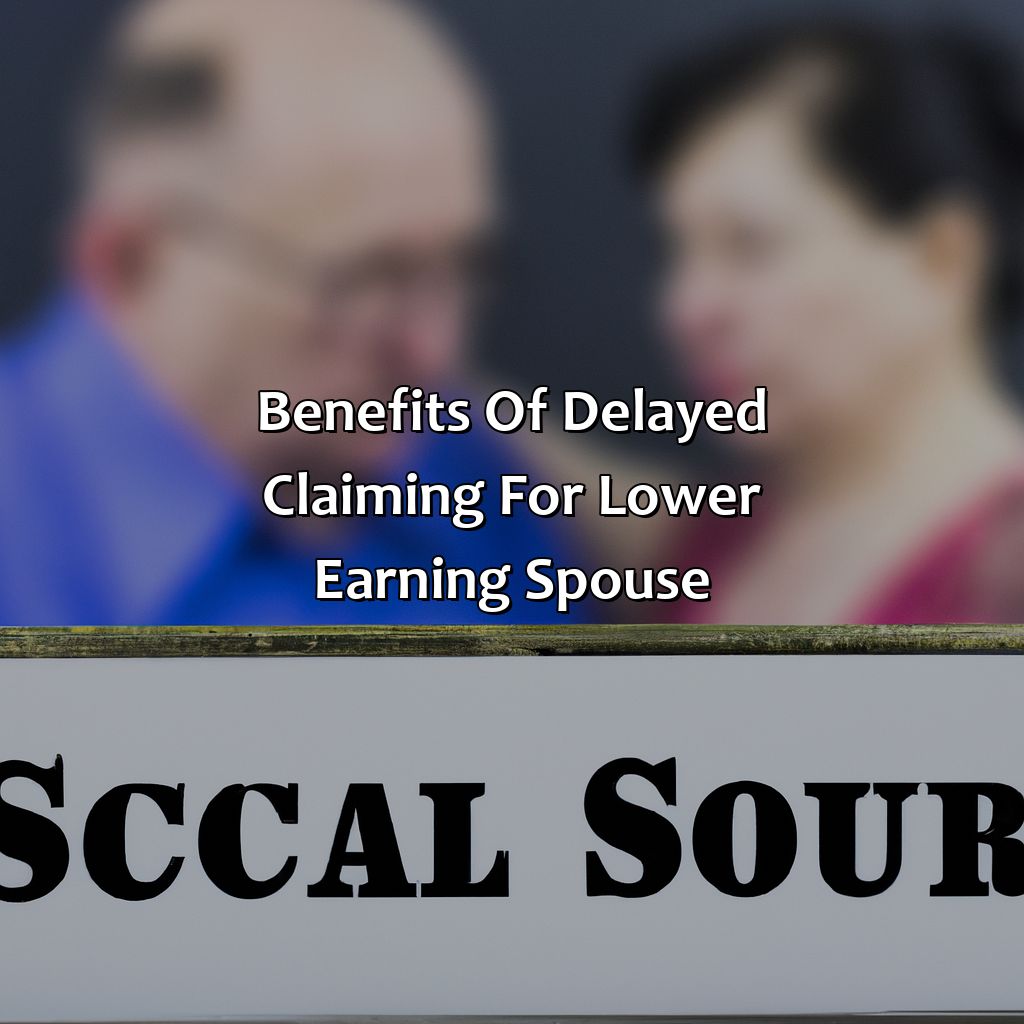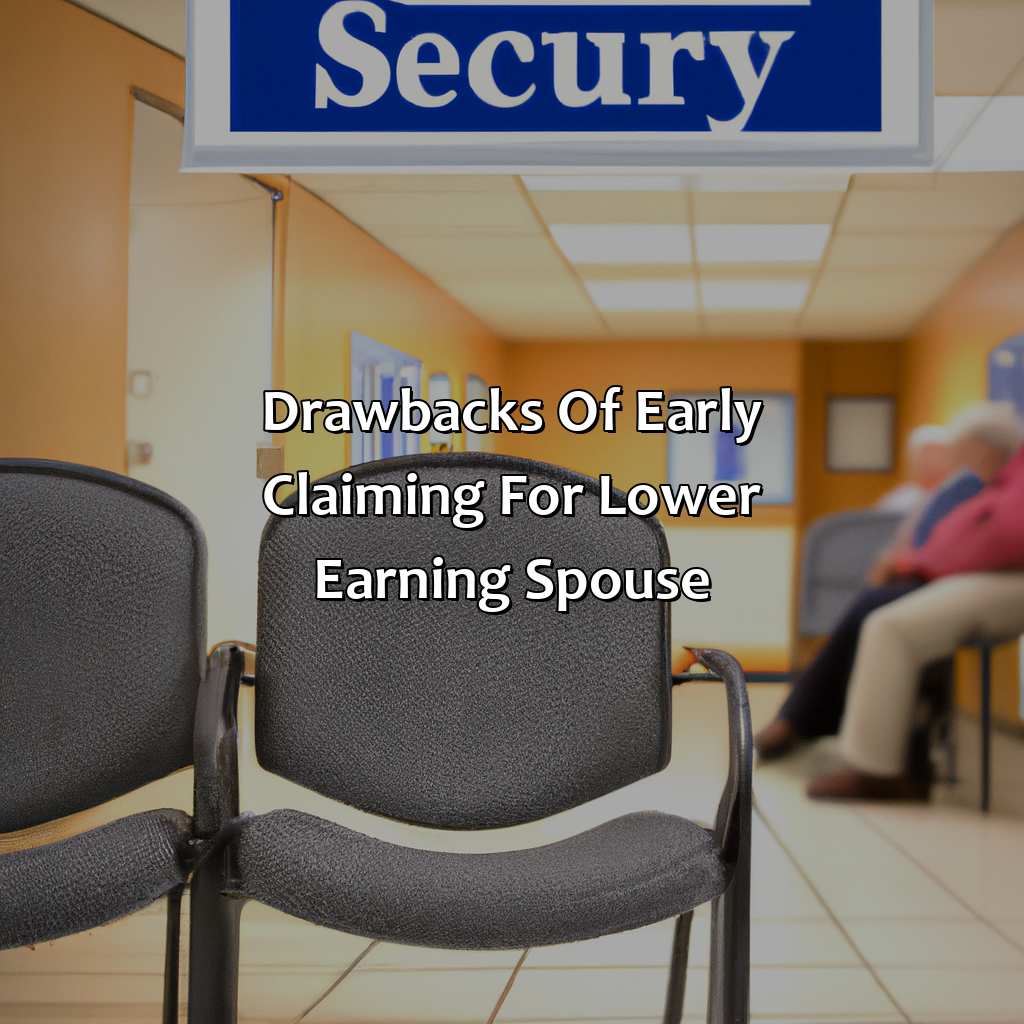When Should Lower-Earning Spouse Claim Social Security?
Key Takeaway:
- Lower-earning spouses may be eligible to claim Social Security benefits based on their own work history or their spouse’s work history, but it is important to meet certain eligibility criteria such as age, marriage duration, and employment history.
- Delaying claiming Social Security benefits can increase the monthly benefits for lower-earning spouses and protect surviving spouse benefits, whereas early claiming may result in reduced monthly benefits and restricted benefits for surviving spouses.
- When deciding when to claim Social Security benefits, lower-earning spouses should consider their financial needs, life expectancy, and health status, as well as the potential impact on their retirement income and taxes.
Do you and your spouse earn different wages? Are you unsure when you should claim Social Security? This article provides insight to help you and your spouse make the best decision. You’ll gain an understanding of when it might be more beneficial for the lower-earning spouse to claim Social Security.
Eligibility Criteria for Claiming Social Security
To be eligible for claiming Social Security, there are certain criteria that need to be met. These include age requirements, work history, and citizenship status. Additionally, the amount of benefits received can vary depending on when one starts claiming. Waiting until full retirement age results in receiving the full benefit amount, while claiming early results in a reduced benefit. Spousal benefits may also be available, depending on the couple’s income and eligibility. It is important to consider these factors when deciding when to claim Social Security.
In addition to the standard criteria, there are also unique circumstances that can affect eligibility. These may include disability, survivor benefits, or even divorce. It is important to understand these options and how they can impact one’s Social Security benefits. Seeking guidance from a financial advisor or Social Security representative can help ensure that all options are considered.
A real-life scenario to consider is when one spouse has a much lower earning record than the other. In this case, it may be beneficial for the lower-earning spouse to claim benefits early while the higher-earning spouse waits until full retirement age. This can provide added income for the couple while still allowing the higher earner to receive the maximum benefit amount in the future. Overall, understanding the eligibility criteria and unique factors at play can help individuals make informed decisions about when to claim Social Security benefits.

Image credits: retiregenz.com by Yuval Washington
Benefits of Delayed Claiming for Lower Earning Spouse
Lower earning spouses should delay claiming their social security benefits to maximize their financial stability in the future. This strategy can bring several benefits, including increased monthly payments, higher spousal survivor benefits, greater flexibility to switch between benefits, and the potential to earn credits that can enhance future social security payouts.
- Delayed claiming can lead to higher monthly payouts, which can significantly boost a lower earning spouse’s financial security in retirement.
- A higher earning spouse can help maximize a lower earning spouse’s benefits by delaying their own social security claim until age 70.
- Waiting to claim benefits can help lower earning spouses access a variety of spousal benefits, such as the ability to receive half of their higher earning spouse’s benefits when they reach full retirement age.
- Delaying and optimizing benefits can allow lower earning spouses to work and earn additional credits that could enhance their future social security payouts.
It is essential to note that these benefits can vary based on individual circumstances and must be evaluated on a case-by-case basis.
A little-known fact is that some divorced spouses may be eligible for social security benefits based on their ex-spouse’s earnings if they meet specific criteria. According to the Social Security Administration, the applicant must be unmarried and at least 62 years old, and their ex-spouse must be entitled to social security benefits.
Understanding the nuances of social security benefits can be confusing, but lower earning spouses who carefully consider their options and plan strategically can maximize their financial security in retirement.

Image credits: retiregenz.com by David Woodhock
Drawbacks of Early Claiming for Lower Earning Spouse
As the Social Security benefits for a lower-earning spouse are tied to the primary earner’s benefit, early claiming can result in reduced long-term benefits. Here are some potential drawbacks of early claiming for a lower-earning spouse:
- Reduced Benefits: Early claiming can decrease the lower-earning spouse’s Social Security benefits by up to 30%. This can have a significant impact on long-term income.
- Limited Options: Claiming early can limit the spouse’s options for claiming strategies. By waiting, the spouse may have more options to maximize their benefits.
- Impact on Survivors: If the primary earner passes away, the lower-earning spouse’s Social Security benefits can increase. However, by claiming early, these benefits may not be maximized.
- Taxes on Benefits: Social Security benefits may be taxed if the spouse’s combined income is above a certain threshold. Claiming early can increase the likelihood of exceeding this threshold.
It is important to carefully consider all of these factors before making a decision about when to claim Social Security benefits. In addition, it may be beneficial to seek advice from a financial professional to ensure that the decision aligns with your unique situation.
When it comes to Social Security benefits, timing is everything. Don’t miss out on potential long-term benefits by claiming too early. Take the time to carefully consider your options and make an informed decision that aligns with your financial goals.

Image credits: retiregenz.com by Yuval Arnold
Considerations for Claiming Social Security Benefits
Social Security benefits are a crucial part of retirement planning. When considering claiming these benefits, various factors have to be analyzed. Ascertaining the right time to claim benefits is vital. The ideal time to begin claiming Social Security benefits should be determined based on factors such as the couple’s life expectancy, current financial status, and other income sources.
One of the main factors to consider when claiming Social Security benefits is the age one begins to claim it. The longer somebody waits, the greater their monthly payment will be. The benefit may increase by eight percent a year up to age 70. Still, every age has its advantages and disadvantages. Another aspect is the couple’s tax situation. Claiming benefits early, while still earning higher income, may increase taxable Social Security benefit income. Additionally, one should consider spousal benefits and survivor benefits, as these can significantly change the couple’s financial situation.
When claiming Social Security benefits, one crucial aspect to consider is longevity. If one has good health and reasonable life expectancy, waiting to claim may increase their lifetime payments. Still, if they have limited life expectancy, it would be best to claim Social Security benefits as soon as possible. Claiming earlier may help them enjoy the benefits while they are still alive. However, financial advisors recommend accountants’ advice first as everyone’s situation varies.
When considering when to claim Social Security benefits as a lower-earning spouse, there are unique considerations. A story of a retiree who claimed too early at age 62 can offer insights. He was a lower-earning spouse and opted to claim Social Security due to lower earnings. However, through proper planning, he discovered that he could have earned greater benefits by waiting to claim.

Image credits: retiregenz.com by Yuval Duncun
Some Facts About When Should Lower-Earning Spouse Claim Social Security:
A lower-earning spouse can claim Social Security benefits as early as age 62. (Source: Social Security Administration)
Claiming Social Security benefits early will result in a reduction in monthly benefits. (Source: AARP)
If a lower-earning spouse waits until their full retirement age, they can receive 50% of their spouse’s full benefit amount. (Source: Social Security Administration)
Waiting until age 70 to claim Social Security benefits can result in even higher monthly benefits. (Source: Forbes)
A lower-earning spouse should consider their own life expectancy and financial situation before deciding when to claim Social Security benefits. (Source: The Balance)
FAQs about When Should Lower-Earning Spouse Claim Social Security?
When should lower-earning spouse claim social security?
Lower-earning spouses have the option to claim social security benefits based on their own earnings history or as much as 50% of their higher-earning spouse’s benefit. The decision on when to claim social security will depend on various factors, including the couple’s financial situation, health, and life expectancy.
What is the advantage of delaying social security benefits?
Delaying social security benefits can result in a higher monthly benefit later on. For each year that you delay claiming social security benefits after your full retirement age, your benefits will increase by about 8% until you reach age 70.
What if the lower-earning spouse has a shorter life expectancy?
If the lower-earning spouse has a shorter life expectancy due to health conditions or family history, it may make sense for them to claim social security benefits earlier to maximize their lifetime benefits. This decision should be made with the help of a financial advisor or social security specialist.
Can a lower-earning spouse claim social security if they have never worked?
Yes, a lower-earning spouse who has never worked can still claim social security benefits based on their higher-earning spouse’s work history. This is known as a spousal benefit and is equal to 50% of the higher-earning spouse’s benefit.
What if the higher-earning spouse is already claiming social security benefits?
If the higher-earning spouse is already claiming social security benefits, the lower-earning spouse may be eligible for a spousal benefit as long as they are at least 62 years old and their spouse is also eligible for social security benefits.
What if the lower-earning spouse has higher lifetime earnings than the higher-earning spouse?
If the lower-earning spouse has higher lifetime earnings than the higher-earning spouse, they may be better off claiming social security benefits based on their own work history. This decision should be made with the help of a financial advisor or social security specialist.
 Checkout this IRS Loophole
Checkout this IRS Loophole 
